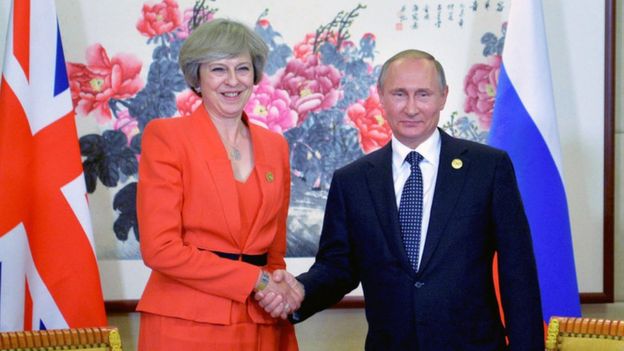Theresa May has launched her strongest attack on Russia yet, accusing Moscow of meddling in elections and carrying out cyber espionage.
Addressing leading business figures at a banquet in London, the prime minister said Vladimir Putin’s government was trying to “undermine free societies”.
Mrs May said it was “planting fake stories” to “sow discord in the West”.
While the UK did not want “perpetual confrontation” with Russia, it would protect its interests, she added.
Her comments are in stark contrast to those of US President Donald Trump, who last week said he believed his Russian counterpart’s denial of intervening in the 2016 presidential election.
In a major foreign policy speech at the Lord Mayor’s Banquet at London’s Guildhall, which Mrs May described as a “very simple message” for President Putin, she said he must choose a very “different path” from the one that in recent years had seen Moscow annex Crimea, foment conflict in Ukraine and launch cyber attacks on governments and Parliaments across Europe.
Russia could be a valuable partner of the West but only if it “plays by the rules”, she argued.
“Russia has repeatedly violated the national airspace of several European countries and mounted a sustained campaign of cyber espionage and disruption.
“This has included meddling in elections and hacking the Danish Ministry of Defence and the Bundestag among many others.”

There are some countries in Europe that believe the West should engage more closely with Russia.
They argue the European Union and the United States should better understand Russia’s point of view, its belief that it is threatened from all sides.
And that more should be done to accommodate this sense of vulnerability, by softening Nato’s approach and reducing sanctions.
Well, not Theresa May. In a speech in the US in February, the prime minister spoke of the need to “engage but beware” of Russia. She has now switched the order and the focus is very much on beware.
She believes that President Putin should be called out for the threat she believes he poses both internationally and in the UK.
The Electoral Commission is investigating claims that Russia used social media to meddle in the Brexit referendum.
So Mrs May is willing to engage with Russia – she is sending the foreign secretary to Moscow next month.
But she also wants Russia to know that Mr Johnson will come with a clear message that its destabilising activities will no longer be tolerated.
Mr Johnson, who will be making his first trip to Russia since becoming foreign secretary in December, has said the UK’s policy towards Moscow must be one of “beware but engage” following a decade of strained relations.
He told MPs earlier this month that he had not seen any evidence of Russia trying to interfere in British elections or the 2016 Brexit vote, in which Moscow has insisted it remained neutral.
“We will take the necessary action to counter Russian activity,” Mrs May added.
“But this is not where we want to be and not the relationship with Russia we want.
“We do not want to return to the Cold War or to be in a state of perpetual confrontation.
“As a permanent member of the UN Security Council, Russia has the reach and the responsibility to play a vital role in promoting international stability.
“Russia can, and I hope one day will, choose this different path. But for as long as Russia does not, we will act together to protect our interests and the international order on which they depend.”
Responding to Mrs May’s speech, former Labour cabinet minister Ben Bradshaw – who has been raising the issue of Russian interference in UK elections for nearly a year – tweeted: “Asking why May suddenly acknowledging Russian interference now having stonewalled for months.”
Alexei Pushkov, a Russian senator involved in media policy, dismissed the PM’s comments.
“The international system of rules must be saved not from Russia but from the advocates of intervention, coups and regime change. Russia will not accept those ‘rules’,” he tweeted.
“The world order that suits May, with the seizure of Iraq, war in Libya, the rise of IS and terrorism in Europe, has had its day. You can’t save it by attacking Russia.”
In Mrs May’s speech, she also said the authorities in Myanmar – formerly known as Burma – must take “full responsibility” for what “looked like ethnic cleansing” of the Rohingya people in Rakhine province.
